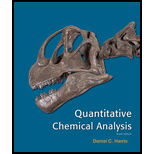
(a)
Interpretation:
Whether the given error is systematic or random has to be stated.
Concept Introduction:
Systematic error:
These error occur due to instrumental flaws or due to errors in experimental design. These errors can be replicated. It can be detected and corrected. These errors are otherwise called as determinate errors.
Random error:
Random errors are uncontrollable, unpredictable and are completely random. These errors are not reproducible. These are caused due to instrumental changes or due to the change in the measuring environment. Random errors has an equal chance of being positive and negative. These errors are otherwise called as indeterminate errors.
To state: Whether the given error is systematic or random
(b)
Interpretation:
Whether the given error is systematic or random has to be stated.
Concept Introduction:
Systematic error:
These error occur due to instrumental flaws or due to errors in experimental design. These errors can be replicated. It can be detected and corrected. These errors are otherwise called as determinate errors.
Random error:
Random errors are uncontrollable, unpredictable and are completely random. These errors are not reproducible. These are caused due to instrumental changes or due to the change in the measuring environment. Random errors has an equal chance of being positive and negative. These errors are otherwise called as indeterminate errors.
To state: Whether the given error is systematic or random
(c)
Interpretation:
Whether the given error is systematic or random has to be stated.
Concept Introduction:
Systematic error:
These error occur due to instrumental flaws or due to errors in experimental design. These errors can be replicated. It can be detected and corrected. These errors are otherwise called as determinate errors.
Random error:
Random errors are uncontrollable, unpredictable and are completely random. These errors are not reproducible. These are caused due to instrumental changes or due to the change in the measuring environment. Random errors has an equal chance of being positive and negative. These errors are otherwise called as indeterminate errors.
To state: Whether the given error is systematic or random
(d)
Interpretation:
Whether the given error is systematic or random has to be stated.
Concept Introduction:
Systematic error:
These error occur due to instrumental flaws or due to errors in experimental design. These errors can be replicated. It can be detected and corrected. These errors are otherwise called as determinate errors.
Random error:
Random errors are uncontrollable, unpredictable and are completely random. These errors are not reproducible. These are caused due to instrumental changes or due to the change in the measuring environment. Random errors has an equal chance of being positive and negative. These errors are otherwise called as indeterminate errors.
To state: Whether the given error is systematic or random
Want to see the full answer?
Check out a sample textbook solution
Chapter 3 Solutions
Quantitative Chemical Analysis
- please provide the structure for this problem, thank youarrow_forwardpresented by Morallen Lig Intermine the hand product for the given mution by adding atoms, bonds, nonhonding diarion panda скуль Step 3: Comp the draw the product Step 2: Agama workup Compithe 429 ملولةarrow_forwardReaction A 0,0arrow_forward
- presented by Morillon Leaning Predict the organic product for the min кусур HSC Adithane carved arnown to come than that to the condon slchroruis in acid in in aquishri with ноюarrow_forward6.15PM Sun Mar 30 K Draw the major product of this reaction. Include any relevant stereochemistry. Ignore inorganic byproducts. Problem 1 of O H [PhзPCH2CH3]*C|¯ NaH Drawing > Q Atoms, Bonds and Draw or tap a nearrow_forward8:17 PM Sun Mar 30 Draw the major product of this reaction. Ignore inorganic byproducts. HSCH2CH2CH2SH, BF3 Probler Drawing Ato Bonds Clarrow_forward
- Name the major organic product of the following action of 4-chloro-4-methyl-1-pentanol in neutral pollution 10+ Now the product. The product has a molecular formula f b. In a singly hain, the starting, material again converts into a secule with the molecular kormula CIO. but with comply Draw the major organic structure inhalationarrow_forwardMacmillan Learning Alcohols can be oxidized by chromic acid derivatives. One such reagent is pyridinium chlorochromate, (C,H,NH*)(CICTO3), commonly known as PCC. Draw the proposed (neutral) intermediate and the organic product in the oxidation of 1-butanol by PCC when carried out in an anhydrous solvent such as CH₂C₁₂. PCC Intermediate OH CH2Cl2 Draw the intermediate. Select Draw Templates More с H Cr о Product Draw the product. Erase Select Draw Templates More H о Erasearrow_forwardIf I have 1-bromopropene, to obtain compound A, I have to add NaOH and another compound. Indicate which compound that would be. A C6H5 CH3arrow_forward
 ChemistryChemistryISBN:9781305957404Author:Steven S. Zumdahl, Susan A. Zumdahl, Donald J. DeCostePublisher:Cengage Learning
ChemistryChemistryISBN:9781305957404Author:Steven S. Zumdahl, Susan A. Zumdahl, Donald J. DeCostePublisher:Cengage Learning ChemistryChemistryISBN:9781259911156Author:Raymond Chang Dr., Jason Overby ProfessorPublisher:McGraw-Hill Education
ChemistryChemistryISBN:9781259911156Author:Raymond Chang Dr., Jason Overby ProfessorPublisher:McGraw-Hill Education Principles of Instrumental AnalysisChemistryISBN:9781305577213Author:Douglas A. Skoog, F. James Holler, Stanley R. CrouchPublisher:Cengage Learning
Principles of Instrumental AnalysisChemistryISBN:9781305577213Author:Douglas A. Skoog, F. James Holler, Stanley R. CrouchPublisher:Cengage Learning Organic ChemistryChemistryISBN:9780078021558Author:Janice Gorzynski Smith Dr.Publisher:McGraw-Hill Education
Organic ChemistryChemistryISBN:9780078021558Author:Janice Gorzynski Smith Dr.Publisher:McGraw-Hill Education Chemistry: Principles and ReactionsChemistryISBN:9781305079373Author:William L. Masterton, Cecile N. HurleyPublisher:Cengage Learning
Chemistry: Principles and ReactionsChemistryISBN:9781305079373Author:William L. Masterton, Cecile N. HurleyPublisher:Cengage Learning Elementary Principles of Chemical Processes, Bind...ChemistryISBN:9781118431221Author:Richard M. Felder, Ronald W. Rousseau, Lisa G. BullardPublisher:WILEY
Elementary Principles of Chemical Processes, Bind...ChemistryISBN:9781118431221Author:Richard M. Felder, Ronald W. Rousseau, Lisa G. BullardPublisher:WILEY





